Bearing Faithful Witness to UN Biodiversity Talks
By: Blair Nelsen, Executive Director, Waterspirit
From August 23-September 3 I attended the third post-2020 working group meetings on the Convention on Biological Diversity’s Global Biodiversity Framework. I became connected to these meetings via the Faith and Biodiversity United Nations Coordination Group, a newly-formed coalition of faith groups working on biodiversity issues. I went with the intention of keeping an eye on efforts to protect marine and freshwater biodiversity, and to encourage a discussion about addressing climate change and biodiversity simultaneously.
In my two years as a UN representative for the Congregation of the Sisters of St. Joseph of Peace — an organization with Department of Global Communications accreditation — this was the first time that I was able to get that close to the process of drafting the text of a global agreement. It was also my first time in a Zoom room trying to write a paragraph together with 300 other people looking at the same screen-shared Word document.
Over the course of those two weeks, many of the points of discussion were familiar to me from other conferences, including whether the goals in each of the 21 targets should be measurable, who should pay for conservation efforts, and whether businesses and the private sector are to be courted or guarded against. I noted with interest the increased attention to the transmission of zoonotic diseases in these talks, undoubtedly fueled by the COVID-19 pandemic. I was glad to hear robust conversation surrounding how to best safeguard conservation area use by Indigenous and traditional peoples — indeed, some parties began to question whether that language needed to be included in every target, or whether their rights should be in a standalone target, understood to be applicable throughout.
Ultimately, I had hoped for more substantive discussion that would address biodiversity and climate change together: these are interlinked crises, and the world cannot tackle one without tackling the other. (This is the same call to action issued in the Healthy People, Healthy Planet petition put out by the Laudato Si’ Movement.) While one of the targets addressed this point, few countries were willing to entertain anything other than general directives, leaving actual, measurable commitments for the UNFCCC-COP26 discussions in Glasgow this November. The failure to adequately address this issue makes me nervous because of the uncertainty of that conference’s outcomes. That conference is only two months away and is shrouded in uncertainty. Which nations will be able to attend due to travel restrictions, and policies regarding which vaccines will be accepted? Will civil society be allowed to attend, or will only party delegates inside an Olympics-style “bubble” be permitted? These considerations raise concerns about the conference’s outcomes, in addition to the usual challenges like establishing consensus and enacting effective measures.
I continue to be of the opinion that climate change should be addressed wherever applicable in UN spaces, and as a cross-cutting issue, that means it should be addressed almost everywhere. With respect to the CBD COP15, I continue to hope that parties will not shy away from this discussion when they meet online in October and in person next year.

